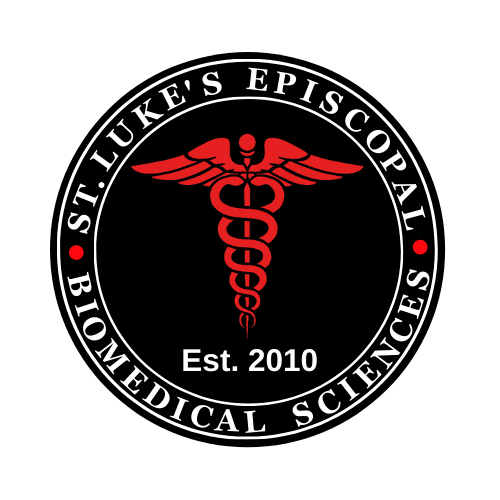St. Luke’s Episcopal School is the only high school in the Mobile, Alabama area offering a four year
pre-professional college preparatory curriculum in biomedical sciences. From its inception, the objective has
been to provide opportunities for high school students to explore and experience a variety of healthcare and
biomedical engineering related fields and career paths. Our dynamic curriculum implements real-world
experience and hands-on learning in fully functioning clinical skills and simulation lab. In addition to interactive
lectures and labs that are conducted by area medical professionals, research scientists, and medical equipment
design experts, our students experience simulated immersion activities in our cutting edge, high tech facility. We
have designated hospital, clinic and triage simulation spaces with a flexible classroom and debriefing area. The
skills area is equipped with A/V simulation-capture technology for viewing in the classroom/ debriefing area
during or after recording. Mannequin-based simulation and standardized patient scenarios enhance skills
practice and may be observed by faculty and students outside the lab through glass walls.
We have developed relationships with approximately 65 affiliates who eagerly participate with us. In addition to
all 5 area hospitals, many private practice offices/clinics, numerous physicians, therapists, nurses, research
scientists and engineers welcome our students into their facilities and allow them to observe and often
participate in their daily tasks. Regularly we host guest instructors, both in person and virtually, from such
renowned institutions as John Innes Centre Department for Microbial Research, Mayo Clinic Department of
Cardiovascular Medicine, MIT Lincoln Laboratories, NASA’s Challenger Learning Center, Vanderbilt Center for
Mechatronic Intelligence, Walter Reed Medical Center, University of Alabama Caldwell Laboratory (a.k.a. Worm
Shack), University of South Alabama Mitchell Cancer Institute, Wheeling University, and many others.
The program consists of 4 core classes and 4 prerequisite choices. Beginning the freshman year Fundamentals
of Biomedical Sciences offers students an in depth study of healthcare systems and clusters, medical history,
HIPAA and safety protocols, infection control, basic assessment tools, and medical terminology. The second
year of the program introduces Comparative Body Systems and students explore the internal and external
similarities and differences of human and animal anatomy and function. Both of these courses incorporate guest
speakers that specialize in occupations related to the unit of study. There are also several clinical observations
at area clinics, offices and hospitals throughout these two classes.
During the third year of the program students that have a continued interest in pursuing a degree in a medical or
health related discipline are encouraged to take Interventions in Biomedical Sciences. In this class students
choose one field of interest to research and immerse themselves in for the entire year. They conduct extensive
research and write a 25 page APA paper while shadowing a mentor who allows them to participate in patient
care under their supervision. This class culminates with a Capstone Presentation to an audience of
approximately 250 – 300 consisting of their peers, parents, faculty, mentors and other health professionals.
Enrollment in this class requires a tandem course selection of Anatomy and Physiology, Marine Biology, or AP
Biology.
All students in the above named classes, Fundamentals, Comparative, and Interventions will spend a large part
of their class time exploring medical equipment and its use in our clinical skills lab. Much of the material is
presented by guest speakers who are most often a practicing professional in their field or an instructor at the
university level. It is common to see these individuals on our campus although sometimes it is logistically
impossible and they will conduct their discussions remotely via Skype, WebEx, or Zoom. Off-campus clinical
observations are paired with procedures and skills. Throughout these three classes students practice techniques
for casting, imaging, intubating, suturing and create a nutrition plan for actual nursing home patients under the
guidance of a registered dietician.
The Innovations in Biomedical Sciences and STEAMM (science, technology, engineering, art, math and
medicine) is our latest addition to the program and allows students to research, design and produce a capstone
project or product. This class requires prerequisites and teacher recommendations depending on the focus the
student chooses. A medical focus will require the successful completion of one of the other Biomedical classes
in the curriculum. However, students with an interest in producing a capstone project related to an engineering
discipline must have completed either the Engineering or Robotics class. A student who chooses to complete
their project in an art related field such as graphic design or media production will need to meet with the
Capstone Committee for approval of their project idea. Everyone enrolled in the Innovations class will be
required to work under the guidance of a mentor. Access to the research and design STEAMM lab, which boasts
advanced technological equipment and software, aids students in this class in their understanding, designing,
and testing of devices such as 3D prosthetic limbs and other assistive and adaptive aids. With the
implementation of 3D Virtual and Augmented (VR/AR) technology, students are able to visualize internal
anatomical structures as well as immerse themselves in realistic settings that allow them to envision and create
potential solutions. Access to telepresence robots, 3D printers, 3D laser printers and engravers, 3D ceramic
printers, computer numerically controlled (CNC) devices, industrial vinyl plotters, green screens, audio and
visual equipment, and programmable simulation mannequins add the opportunity for students to incorporate
impressive components into their college application portfolio.


